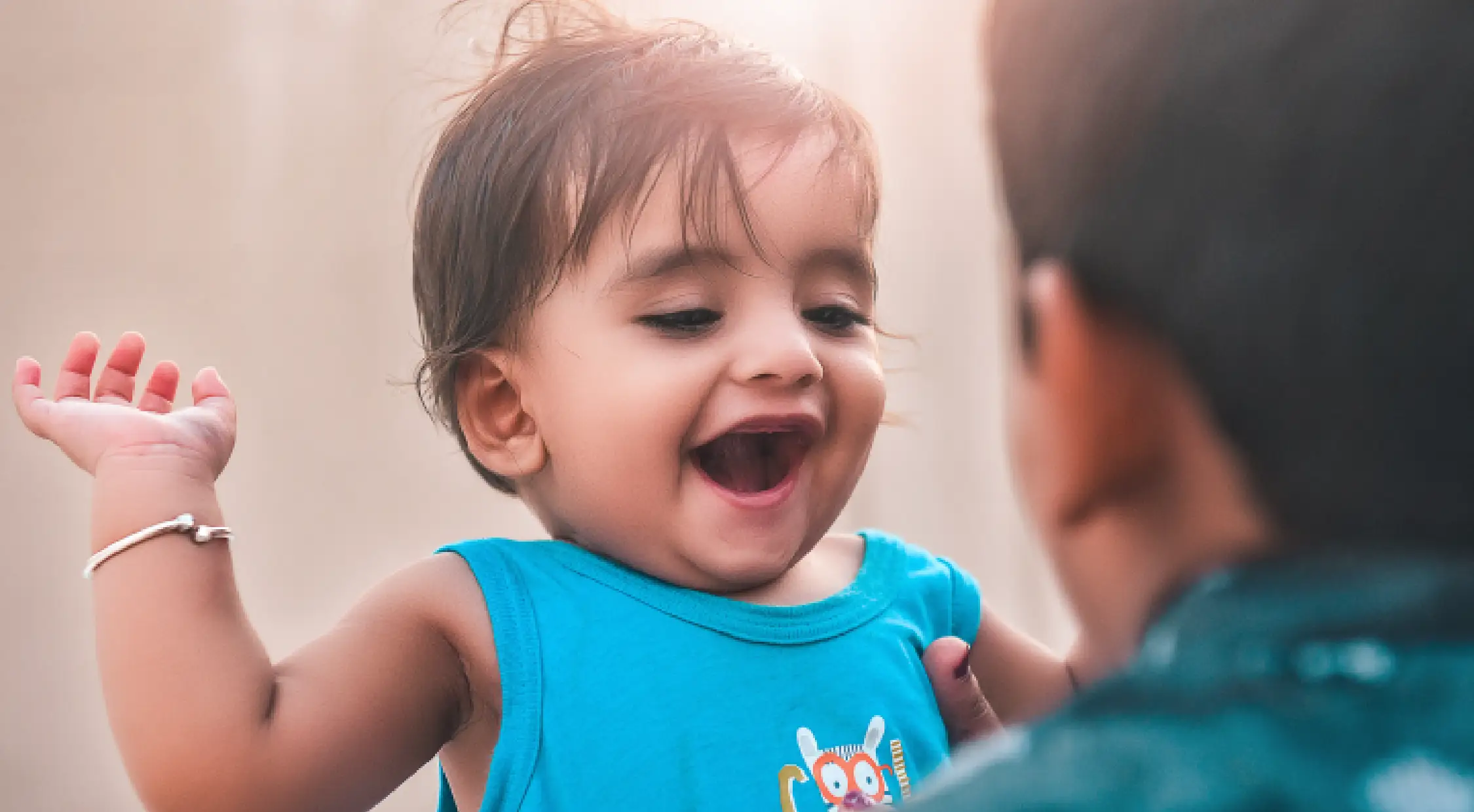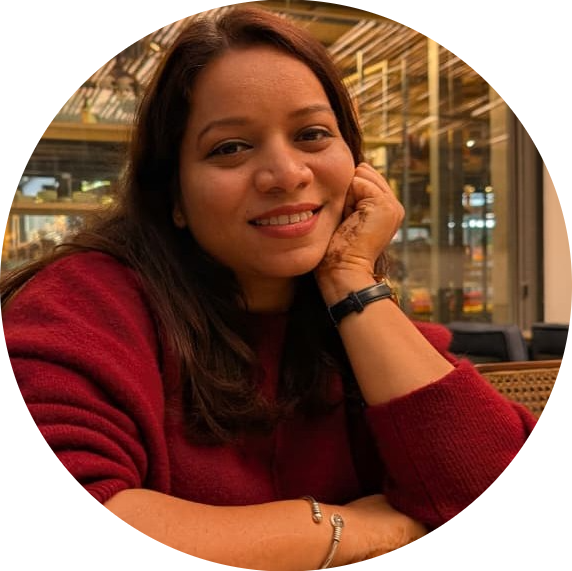When do babies start speaking? When will they understand what you say? When will they start responding?
Like every other baby milestone, speech development is unique to every child. Some little ones are early chatterboxes, while others take their time before saying their first words. But here’s the exciting part: the coos, giggles, and babbles you hear in the first few months are stepping stones to speech.
To make things easier for you, we’ve put together a month-by-month guide to baby speech milestones and what you can expect as your little one learns to express themselves.
When Do Babies Start Babbling?
You’ll notice most babies may start babbling between 4 to 6 months. They’ll make sounds like “ba-ba”, “da-da”, and “ma-ma”, though at this stage they don’t necessarily know what these mean. Babbling is the series of adorable sounds your infant makes before they are able to form words or sentences. This stage marks the beginning of communication. It shows that your baby is experimenting with sounds, learning to control their mouth, and building the foundation for future speech.
If you’re wondering when your baby should start babbling, remember every child develops at their own pace. However, if your child isn’t babbling by 9 months, it may be worth discussing with your paediatrician.
When Do Babies Start Talking?
By around 18 months, you’ll find that most toddlers have a vocabulary of about 10 to 20 words. By 2 years, that jumps to 50+ words, and they begin to join two words together like “more milk” or “go out”.
Most babies say their first real words by the time they reach one year. It could be something as simple as “mama” or “papa”. But before that, they’ve already been busy communicating through gestures, pointing, babbling, and responding to tone.
But when do babies start talking clearly? It usually happens between 2 and 3 years. However, some children take longer. Speech delays in babies are not uncommon.
Baby Speech Milestones Chart
Here’s a simple baby speech milestones chart so you know what to expect:
1. Baby Talk at 3 Months
- Babies respond to sounds with coos and smiles.
- They recognise your voice and may grow quiet when you talk.
- Early attempts at communication often look like gurgles or vowel sounds.
2. Baby Talk at 6 Months
- This is when babies usually start babbling.
- Expect “ba-ba”, “ga-ga”, or “da-da” sounds.
- They enjoy back-and-forth “conversations” with you.
3. Baby Talk at 9 Months
- Your baby may begin to understand simple words like “no” or “bye-bye”.
- They use gestures like pointing or waving.
- Babbling becomes more complex and speech-like.
4. Baby Talk at 12-18 Months
- Around their first birthday, babies may say their first words.
- Common examples: “mama”, “papa”, “ball”, “dog”.
- They understand more than they can say, usually 50+ words by 18 months.
5. Baby Talk at 18 Months
- Vocabulary of 10 to 20 words.
- They may point to objects when you name them.
- Start experimenting with short phrases.
6. Baby Talk at 2 Years
- Vocabulary expands rapidly (50 to 100+ words).
- They start forming two-word phrases such as “want water” or “come here”.
- Begin asking simple questions like “What’s that?”
7. Baby Talk at 3 Years
- Vocabulary grows to 200+ words.
- Speech becomes clearer, though some sounds may still be tricky.
- They can form simple sentences and engage in brief conversations.
Signs of a Speech Delay in a Toddler
Every child has their own rhythm when it comes to learning to talk. But as parents, it helps to know what might signal a delay so you can step in with the right support if needed.
Here are a few age-wise signs to watch out for:
By 12 Months
At this stage, babies usually babble, point, or wave to communicate. If your little one isn’t making sounds, not trying to gesture, or doesn’t respond when you call their name, it’s worth keeping an eye on.
By 18 Months
Most toddlers can say a handful of words by now and enjoy copying sounds. If your child isn’t trying to say simple words like “mama” or “ball” or doesn’t imitate what you say, that could be an early sign of a delay.
By 2 to 3 Years
This is when children usually start stringing two words together. You’ll hear them trying to say words like “want milk” or “go park”. If your toddler isn’t combining words, or if people outside the family find it hard to understand them, a quick chat with your doctor may help.
By 3 Years
By now, kids typically have a growing vocabulary and enjoy talking in short sentences. If your child’s speech is still very limited or unclear, it may need a little extra support.
By 4 Years
At this age, most children can hold conversations that people outside the family can understand. If your child is still struggling with full sentences or clarity, it’s a good idea to seek advice.
The most important thing to remember is: don’t panic. Many children who talk late catch up quickly with the right environment and encouragement. The key is to notice patterns, trust your instincts, and seek help early if you’re worried about your baby’s speech milestones.
What to Do if Your Baby Isn’t Talking
If your baby seems delayed, here’s what you can do:
- Consult your paediatrician or a speech-language pathologist.
- Rule out hearing problems, as they directly impact speech.
- Engage your child in plenty of conversation and play.
- Consider early intervention if your doctor suggests it.
How to Teach a Baby to Talk
You don’t need to conduct formal lessons to teach your baby their first words. You can turn everyday moments into fun, little conversations. Here are a few easy ways to help your little one find their voice:
- Talk, Talk, and Talk Some More: Your baby loves the sound of your voice. Whether you’re cooking, folding clothes, or simply walking around the house, keep talking to them. Make little commentaries on what you’re doing, as this helps build vocabulary and supports early speech milestones for babies.
- Use Names Instead of Pronouns: Instead of saying “this is mine”, try saying “this is Mama’s cup”. Babies latch on to names quicker, and it helps them connect words with people or objects they see every day.
- Speak Clearly: We know it’s hard to resist slipping into baby talk every time you see your little bundle of cuteness, but speaking clearly with them is important. It gives them a “clean version” of words to imitate. You don’t need to overdo it, just pronounce simple, everyday words clearly.
- Bring Music and Rhymes Into Playtime: Children adore rhythm. Singing songs and rhymes makes language playful and memorable. And don’t worry if you’re off-key, your baby thinks you’re a rockstar anyway!
- Keep Repeating Words: If your toddler points to a ball and says “ba”, say, “Yes, that’s a ball! Ball!” Repetition strengthens memory, and soon enough, they’ll surprise you by saying it clearly. This kind of reinforcement is a big step in achieving speech milestones for a baby.
- Give Them Time to Reply: It’s tempting to jump in when your baby pauses, but wait a few seconds. That silence is their way of trying to process and respond, even if it’s just a coo or a giggle.
- Encourage Imitation: Babies are natural mimics. That’s their way of learning things. Clap your hands, wave goodbye, or make funny animal sounds and watch how quickly they try to copy you. Don’t forget to cheer them on when they do!
Tip: Keep it light, fun, and pressure-free. Talking isn’t a race, and every “ba-ba” and “da-da” is worth celebrating!
How Does Preschool Help With Toddler Speech Delay?
A quality preschool environment provides structured activities, songs, rhymes, and peer interactions. All of this contributes to a toddler’s language development and improved communication skills. Preschool teachers are trained to support children with speech delays and gently guide babies through their speaking milestones in a fun, interactive way.
At KLAY Preschools, our expert educators use play-based learning and personalised attention to help every child find their voice with confidence.
Book a visit to your nearest KLAY centre today!
FAQs:
When do babies say their first word?
You can hear your baby’s first word by the time they reach the age of 12 months. But every child is different, so it can be earlier or later for your little one.
What is considered baby talk?
Baby talk usually refers to the coos and babbles babies make before forming real words.
How can I encourage my baby to start talking?
To encourage your baby to reach their talking milestones, as a parent, you can talk to them often, read, sing, and respond to their sounds.
I’m concerned about my baby not reaching their speaking milestones on time. What should I do?
Baby speech milestones are not set in stone. Your baby may be an early riser or a late bloomer. However, if your baby is still facing significant speech delays, it’s best to consult your paediatrician and/or a speech therapist to rule out any medical assistance.
What are some ways to help my baby develop language skills?
To help your baby talk and develop their language skills, have lots of conversations with them, indulge in storytelling, rhymes, and songs, and allow them to repeat or mimic you.
How many words should an 18-month-old and a 2-year-old say?
By the time your baby reaches 18 months, they usually know around 10 to 20 words. And by the age of 2, their vocabulary should be more than 50 words.
Are bilingual children delayed talkers?
Not necessarily. They may mix languages at first, but usually catch up quickly.
Can a 6-month-old say mama?
They may babble “ma-ma”, though it might not yet mean “mama”.
















Subscribe to our newsletter
[contact-form-7 id="12706" title="Newsletter Form for post page"]Our Related Blogs
Yoga Benefits, Activities, and Poses for Preschoolers
For preschoolers, yoga isn’t about perfection but about giggles and benefits. So, are you curious how a simple stretch can support a child’s focus, flexibility, and emotional well-being? Let’s roll...
Year-End Reflection and Goal Setting for Children
Parenting is a journey filled with the brightest moments and valuable lessons, both for us and our children. As the year draws to a close, it’s the perfect time to...
Work-Life Balance Solutions for Parents in Emerald Hills Rd, Sector 65, Gurugram: The KLAY Daycare Advantage
Finding the perfect balance between professional commitments and parenting is a challenge for many working families in Gurugram. Parents in Emerald Hills Rd, Sector 65, especially, look for childcare solutions...